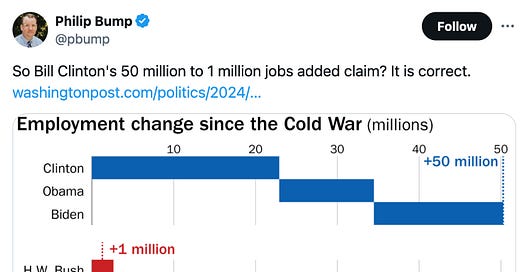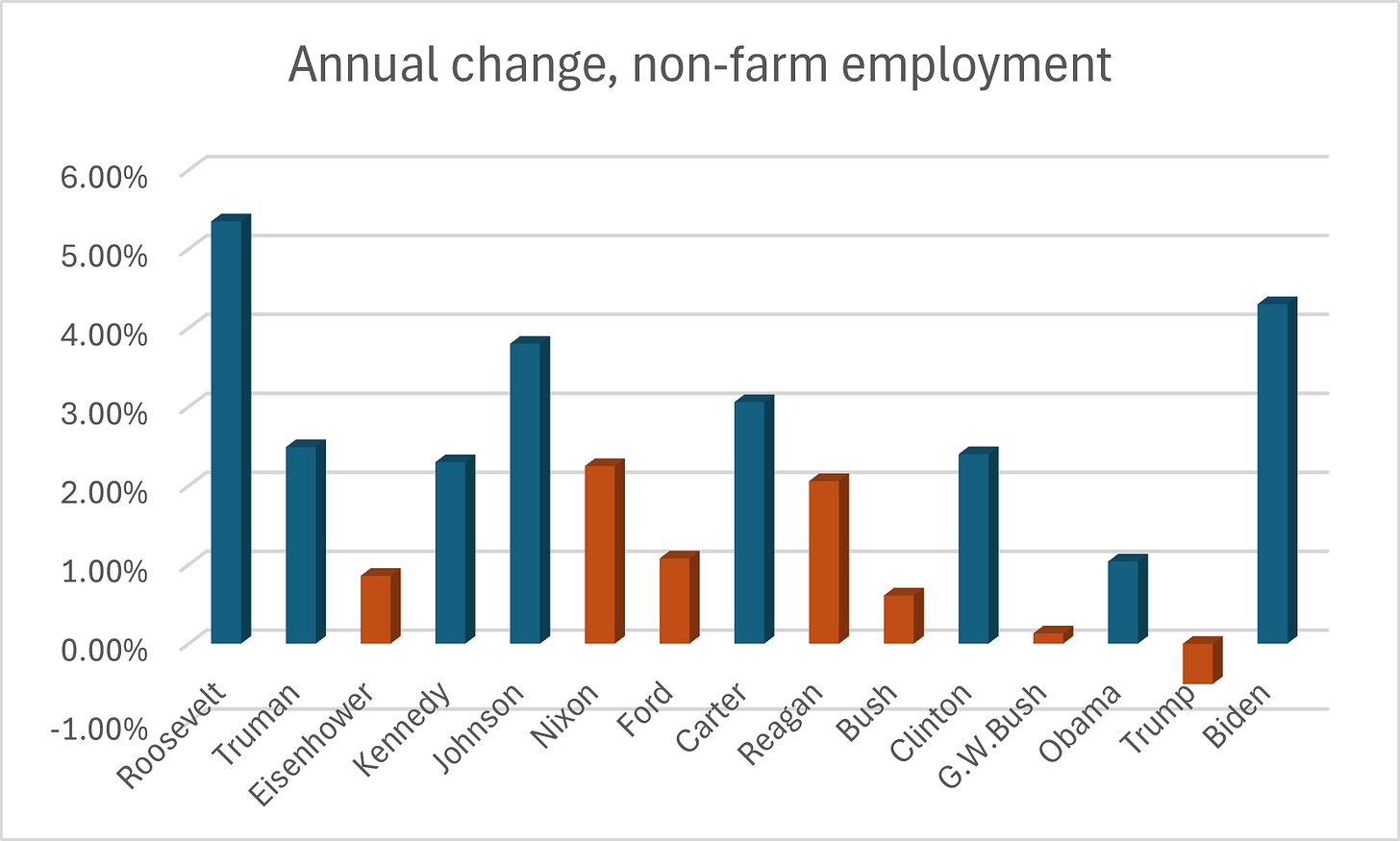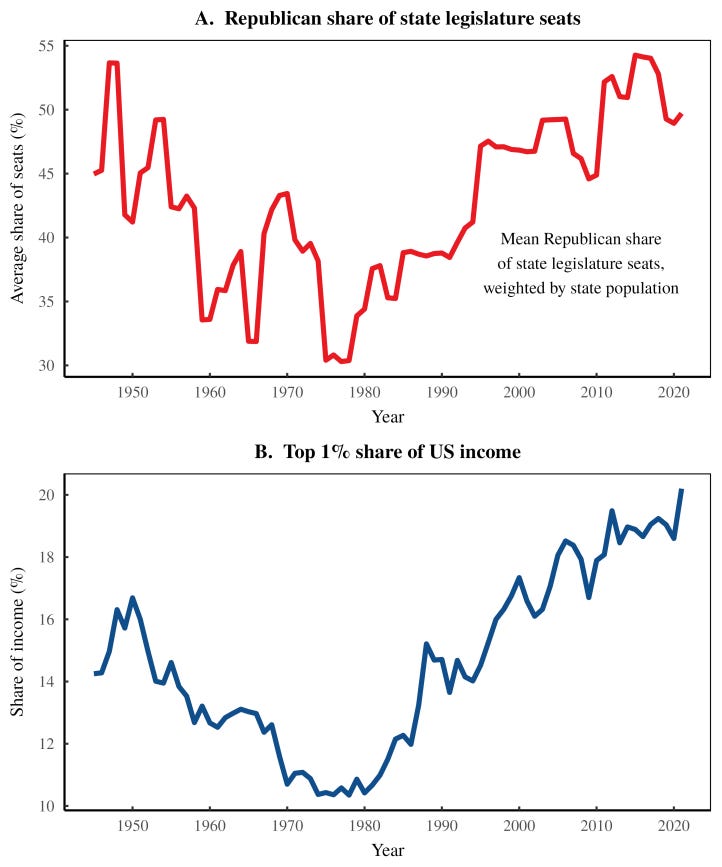No, Republicans Are Not Better for the Economy
Taking on one of the dumbest and most persistent myths.
Since we’re in debunking mode…
If there’s one thing everybody knows, it’s that Republicans are better at managing the economy than the Democrats.
In poll after poll, the majority of voters will consistently tell you that they trust the Republicans more than the Democrats to manage the US economy, and it’s been that way for as long as I can remember. People vote for Republicans because they claim to be “fiscally responsible” and they think that Republicans will be better for the economy than Democrats.
The thing is, it’s simply not true. Not only is it not true, but it turns out to be the opposite of true. And not just by a little—but by a lot.
We’ve known this for some time. I can recall reading an article at least fifteen or twenty years ago already in Forbes Magazine—not exactly a bastion of far left thought—which went over a mountain of statistics pointing this out. That article has stuck with me ever since. And in the intervening years, the divergence has become even more profound.
They key things to take away are:
By every possible measure of macroeconomic performance—including those that affect the working class—the economy does better under Democrats than under Republicans.
It’s been that way for nearly a hundred years.
The difference is not small—it’s quite large. So large, in fact, that economists are at a loss to explain it.
No matter how you skew the statistics—time lags, factoring out things like recessions, oil shocks, or other unexpected events, etc.—the result still stands. There is no way to statistically massage it away.
This divergence is the same for Canada, but not for European countries.
Even Republicans and conservative think tanks acknowledge this is true—they just don’t talk about it.
So why does everyone think that Republicans are better for the economy?
The Evidence
While I couldn’t find the original Forbes article I read years ago, here is a more recent one (emphasis mine):
Trump said out loud the same thing that Hillary Clinton has asserted—and top academics and journalists have confirmed. The same thing I’ve been compiling cold, hard government data on since 1980: By crucial metrics like GDP, job creation, business investment and avoiding recessions, the economy does a lot better with Democrats in the White House than with Republicans. Just one eye-opening example: Nine of the last 10 recessions have been under Republicans…
It is simply a fact that since World War II, Democratic presidents have seen 24.4 million more jobs created on their watch—an average of 78.6% more jobs created per year of Democratic administrations—than have Republican presidents. Ditto real GDP growth, 44% higher under Democratic presidents. On the flip side, unemployment has been 18% higher under GOP presidents.
Democratic nominee Hillary and former President Bill Clinton have touted this dynamic—though not enough, in my opinion—and the non-partisan Politifact has vetted their comments. Take Bill Clinton’s line at the 2012 Democratic Convention: “Since 1961, for 52 years now, the Republicans have held the White House 28 years, the Democrats 24…. In those 52 years, our private economy has produced 66 million private-sector jobs. So what's the jobs score? Republicans 24 million, Democrats 42 [million].”
The Politifact verdict—and remember that folks love nothing better than slapping Bill Clinton with Pinocchios—“We rate his claim True.” Powerfull stuff.
Trump Is Right About One Thing: 'The Economy Does Better Under The Democrats' (Forbes)
The author of the above article touts a Web site he created which lists the many statistics that confirm this divergence:
Speaking at the most recent Democratic convention, the former president laid down another astonishing statistic: “Since the end of the Cold War in 1989, America has created about 51 million new jobs. I swear I checked this three times. Even I couldn’t believe it. What’s the score? Democrats 50, Republicans one.”
You know that the media would like nothing more than to discredit this and call Clinton a liar. Even the slightest error would get this labelled as “mostly false” or even “pants on fire” by the ostensibly neutral fact checkers. Yet even they were unable to refute it:
Most GOP-devastating statistic in Bill Clinton's DNC speech confirmed by fact checker (Raw Story)
A Web site put up by Congressional Democrats lists several of the same points:
Of the seven presidents with the highest annual economic growth rate, five are Democrats. Conversely, five of the seven presidents with the lowest economic growth rate are Republicans.
Of the seven presidents with the highest annual rate of job creation, six are Democrats. On the flip side, six of the seven presidents with the lowest job creation are Republicans.
Most recently, President Biden has overseen 5.7% real GDP growth, the highest annual economic growth rate since 1984, and the creation of 7.4 million jobs.
President Biden Continues the Trend of Strong Economic Growth and Job Creation Under Democratic Presidents (Joint Economic Committee)
In fact, during his first term, Trump was the first president since the Great Depression to preside over a net loss of American jobs. Yet, astoundingly, he was considered to be “better on the economy” and “more trusted” to manage it according to voter polls during the 2024 election. Now, in fairness, a lot of those losses were due to the pandemic. But that didn’t stop him from taking credit for other pandemic-related statistics (such as low border crossings), nor did it prevent Joe Biden from being blamed for other pandemic-related circumstances (such as high inflation).
The data are clear: Democrats are far better for the economy, and have been since at least the Second World War. On average, GDP has grown by 4.1 percent under Democrats and only 2.5 percent under Republicans. When it comes to jobs, since the Truman administration, Democrats have added more than twice the amount of jobs as Republicans (70.5 million jobs under Democrats compared to 29.1 million under Republicans). The stock market—which should be the ultimate arbiter for rich people—also goes up more under Democrats, too. The S&P 500 gained an average of 11.2 percent under Democrats and 6.9 percent under Republicans since 1945. Economic bad times tend to happen under Republicans: 10 of the last 11 recessions started under Republican administrations1. It’s notable that every unified Republican government (Presidency, House and Senate) has led to a financial crash:
Every “Unified Republican Government” Ever Has Led to a Financial Crash (The Reformed Broker)
But if you want even more hard economic facts, a detailed study was done by two highly respected Princeton economists, Alan Blinder and Mark Watson. The paper was published in the peer-reviewed journal The American Economic Review. According to their summary:
The US economy has performed better when the president of the United States is a Democrat rather than a Republican, almost regardless of how one measures performance…The superiority of economic performance under Democrats rather than Republicans is nearly ubiquitous: it holds almost regardless of how you define success. By many measures, the performance gap is startlingly large…
Here’s an article in Murdoch-owned The Wall Street Journal—again, not exactly a bastion of left-wing economics or pro-Democrat sentiment—describing the results of the study (my emphasis):
The U.S. economy has performed better since World War II when the president is a Democrat rather than a Republican, two prominent Princeton University economists conclude. The reasons, they say, involve more luck than successful policies.
Over the past 64 years and 16 presidential terms, the U.S. grew at an average rate of 4.35% when a Democrat was in the White House and at a 2.54% when a Republican was, a gap the economists call "astoundingly large."
A similar partisan growth gap is seen in Canada, but they found no statistically significant difference between economic growth records of left and right governments in the U.K., France or Germany.
https://www.wsj.com/articles/BL-WB-42134 (paywalled)
Notice how they spin it by attributing it to “luck” rather than policy given their editorial slant2. But note that they—even they—do not deny these facts!
A somewhat less editorialized summary of the Princeton study was featured in the The New York Times. According to the story (my emphasis):
A president has only limited control over the economy. And yet there has been a stark pattern in the United States for nearly a century. The economy has grown significantly faster under Democratic presidents than Republican ones.
It’s true about almost any major indicator: gross domestic product, employment, incomes, productivity, even stock prices. It’s true if you examine only the precise period when a president is in office, or instead assume that a president’s policies affect the economy only after a lag and don’t start his economic clock until months after he takes office.
The gap “holds almost regardless of how you define success,” two economics professors at Princeton, Alan Blinder and Mark Watson, write. They describe it as “startlingly large.”
Since 1933, the economy has grown at an annual average rate of 4.6 percent under Democratic presidents and 2.4 percent under Republicans, according to a Times analysis. In more concrete terms: The average income of Americans would be more than double its current level if the economy had somehow grown at the Democratic rate for all of the past nine decades. If anything, that period (which is based on data availability) is too kind to Republicans, because it excludes the portion of the Great Depression that happened on Herbert Hoover’s watch.
Why Are Republican Presidents So Bad for the Economy? (Internet Archive)
You can read the original academic paper by Blinder and Watson yourself:
https://pubs.aeaweb.org/doi/pdfplus/10.1257/aer.20140913
And here’s a report from the Economic Policy Institute which references the same study and makes a similar case:
Economic performance is stronger when Democrats hold the White House (EPI)
So the real mystery here is not which political party is better for the economy. It’s not in doubt. The evidence here is overwhelming: the economy does far, far better under Democrats than Republicans, and this is true as far back as we have reliable data. Rather, the real mysteries are:
Why does the economy do so much better under Democratic administrations? Even partisan academics have to admit that presidents only have limited control over the economy. According to conventional wisdom, the difference between which party controls the White House should not be this large. And yet it is.
Why does everyone believe the exact opposite?
Why is this the case?
While the original paper is mostly silent on the issue, the New York Times article speculates as to why this might be the case. For my part, I think their conclusions are basically on point.
It’s actually quite simple: Democratic administrations simply follow the conventional economic wisdom. This may seem surprising, given that conservatives tout themselves as the experts when it comes to the economy. But conventional centrist economics has known since the Great Depression that governments need to spend countercyclically in order to stimulate the economy during a downturn. That is, Democrats are more willing to use stimulus and spend money in a bad economy than are Republicans. In addition, redistributive and pro-labor policies favored by Democrats lead to a stronger economy since consumers have more money to spend. This means a better economy for everyone, even the rich, who own most of what that money gets spent on.
Meanwhile, for the last fifty years, Republicans have focused exclusively on tax cuts, deregulation, and spending cuts (except for the military) to manage the economy. While both parties have presided over large deficits, those under Democrats have been caused mainly by stimulating the economy in downturns, with fairly good results. Republican deficits, by contrast, have been caused primarily by drastically slashing tax rates for the wealthiest Americans and big corporations. Republican economic wisdom holds that tax cuts for rich people will cause them to spend and invest more, stimulating the economy and sparking economic growth. But a recent paper by the prestigious London School of Economics determined that “trickle-down” economics simply does not work:
The new paper, by David Hope of the London School of Economics and Julian Limberg of King's College London, examines 18 developed countries — from Australia to the United States — over a 50-year period from 1965 to 2015. The study compared countries that passed tax cuts in a specific year, such as the U.S. in 1982 when President Ronald Reagan slashed taxes on the wealthy, with those that didn't, and then examined their economic outcomes.
Per capita gross domestic product and unemployment rates were nearly identical after five years in countries that slashed taxes on the rich and in those that didn't, the study found.
But the analysis discovered one major change: The incomes of the rich grew much faster in countries where tax rates were lowered. Instead of trickling down to the middle class, tax cuts for the rich may not accomplish much more than help the rich keep more of their riches and exacerbate income inequality, the research indicates.
50 years of tax cuts for the rich failed to trickle down, economics study says (CBS News)
This may explain why there isn’t such a massive divergence between Conservative and Liberal (Labor) parties in Western Europe and elsewhere. Most political parties overseas are closer to the political center—and to conventional economic wisdom—than the Republicans in the United States, who are more likely to base their policies on the writings of Friedrich Hayek, Ludvig von Mises or Ayn Rand than on John Maynard Keynes. Right-wing parties in the Americas tend to subscribe to a radical form of extreme libertarianism far outside mainstream economic thought as the photo above illustrates. Can anyone imagine the Prime Minister of the UK or the Chancellor of Germany posing for such a photo?
There is no parallel for this in Europe where politicians are far more moderate and the wealthy have much less influence over politics and culture than they have here in the United States. Republican leaders in the US have bought into the idea that we need to “balance the budget” and run government “like a business,” except that doesn’t work—the government is not like a business and the national debt is nothing like personal household debt.
In an excellent post, economist Blair Fix takes a look at partisan politics and the rise of extreme plutocracy in the United States. As with the studies above, he marshals a tremendous amount of data and statistics to back up his conclusions. He finds that Republican control of legislatures at every level of government—federal, state and local—is associated with increasing plutocracy and falling fortunes for the lower and middle classes:
On this partisan front, the historical backdrop is that for forty years, Republicans have been playing a political shell game. As Jay Michaelson puts it, Republicans “appear populist … but act plutocrat”. What’s disorienting is that this shell game has worked. Although Republicans have historically governed for the benefit of the rich, they have recently rebranded themselves (successfully, it seems) as the party of the working class.
Partisan Politics and the Road to Plutocracy (Economics from the Top Down)
So not only is economic performance worse under Republicans, but the economy becomes much more unequal, too. So why do so many average-income people continue to vote for them? Despite all of the evidence, polls consistently show voters trust the Republicans more than the Democrats when it comes to economic issues. Why is that?
As Fix notes in his post, while Democratic control of legislatures weakens the drift toward plutocracy, it does not reverse it. This is important, and a key part of the problem with Democratic messaging and policies. We should—and must—do better.
Why don’t more people know this?
In a fascinating post, historian Heather Cox Richardson attributes the false belief that Republicans are better for the economy all the way back to the nineteenth century and the aftermath of the Civil War. The whole post is definitely worth a read:
Part of Americans’ sour mood about the economy stems from the poor coverage all the good economic news has received. Part of it is that rising prices are more immediately obvious than the wage gains that have outpaced them. But a large part of it is the historic habit of thinking that Republicans manage the economy better than Democrats do.
That myth began immediately after the Civil War when Democrats demanded the government renege on the generous terms under which it had floated bonds during the war. When the Treasury put those bonds on the market, they were a risky proposition, but with the United States secure after the war, calculations changed, and Democrats charged that investors had gotten too good a deal…
But I find this hard to swallow. People still believe this myth because of events all the way back in the late 1800s? Really??? And surely the Great Depression under a Republican administration and the recovery under a Democratic one should have put that myth to rest, permanently.
I think a more plausible explanation might have to do with more recent history. The Carter administration presided over the stagflation of the late 1970s, and the subsequent economic recovery happened under Ronald Reagan. Since that time, Republicans have portrayed themselves as economic wizards due to their supposed “hard-nosed” business acumen. The “Morning in America” boom in the early 1980s was seen as validating Republicans’ libertarian, low-tax approach to economics. At the same time, the economics profession, under the influence of Milton Friedman and the Chicago School, was entirely captured by free market fundamentalism, displacing all earlier economic thought, giving Republican economic ideas the imprimatur of authority.
There are a couple of things to note here. One is that the economic conditions of the 1970s were caused by a massive spike in the price of oil, which was out of the president’s control. The end of Bretton Woods—under a Republican president—played a role as well. And the price of oil fell under Reagan due to the opening of Alaska’s Prudhoe Bay and the UK’s North Sea oil fields and subsequent decline in the pricing power of the OPEC cartel.
And when you compare the economic performance of the Keynesian era—the 1950s through 1980—to the subsequent Neoliberal era from 1980 through 2008—you will find that economic growth was actually higher under Keynesianism than under Neoliberalism. Nonetheless, Neoliberalism portrayed itself as the only “scientific” approach to economics, even as the evidence of poor performance and skyrocketing inequality mounted. The memory of the 1970s lingered on to the present day.
But I think the real reason might be even more basic
Business people and the wealthy tend to vote Republican, and since the average Joe thinks business leaders know that they’re doing, they assume that voting for a Republican is somehow “pro-business.” The little guy—who knows next to nothing about business, politics or economics—sees business people as economically hyper-competent, so he trusts them to run the nation’s economy despite mountains of evidence to the contrary. “The bosses vote for Republicans, so they must be good for business,” is the extent of his thinking.
But there’s a difference between being pro-business and being pro-market. Business people in the US are uniquely willing to trade a less functional economy for greater personal gain. This causes greater inequality—which is bad for business—but they don’t care. As long as they can grab for themselves an ever-larger share of a smaller pie, they will always prefer that to a rising tide lifting all boats.
The American wealth class has always despised workers and harbored antipathy toward the poor and will gladly sacrifice enhanced economic growth and prosperity to punish them, even at a loss to themselves. By contrast, the upper classes in Europe do not have the same level of antipathy, so they have no inherent problem with redistribution or government spending, and they invest more in their human capital. Being pro-business in the US simply means being for plutocracy and looting rather than for broad-based economic growth.
Part of it is also due to anti-communist hysteria, I think. The Democrats are constantly portrayed as “communists,” in the right-wing media, and low information voters eat it up. Even if that were true, then the evidence clearly shows that Communists are apparently better at running the capitalist economic machine than the Republicans based on the data.
In other words, it’s all just marketing. Republicans bill themselves as “pro business” and “fiscally responsible,” just like banks are for “prudent lending,” oil companies are for “environmental stewardship,” fast food companies are for “healthy lifestyles,” and “your call is very important to us.” It’s all just marketing. As Fix finds in his post above, voting for Republicans is highly correlated with a very restrictive media diet consisting almost exclusively of Fox News and Facebook (i.e. the “Foxbook diet”).
Finally, the fact that the vast majority of people in the US believe the exact opposite of what is objectively true based on cold, hard facts is a microcosm for pretty much everything wrong with American political discourse these days. And seemingly no amount of facts will change anyone’s mind. As always, the mind control ray will continue to determine reality in the twenty-first century United States, and not facts or data.
So, no, Republicans are not better for the economy. And they never have been. The next time someone tells you that, they are simply mistaken, or perhaps delusional. And I expect the upcoming economic debacle we’re about to experience will make this performance gap even more clear.
What the paper actually says: “Some, maybe all, of these might be considered blends of good policy and good luck. But our empirical analysis does not attribute any of the partisan growth gap to fiscal or monetary policy.” Given that the divergence is nearly fifty percent when it comes to GDP, that's some remarkable luck, indeed. If only the Democrats had that kind of luck with elections.








"…Right-wing parties in the Americas tend to subscribe to a radical form of extreme libertarianism far outside mainstream economic thought…."
Yup. I've been reading the story of the propaganda that made this denial of our collective existence for decades, but have only really appreciated the real coup in recent years. Essentially, the extremely wealthy (the duPonts, Harold Luhnow, J. Howard Pew, lots of others) have been paying to develop and spread this nonsense since the New Deal dared to gut them… er, tax them at more appropriate levels.
When the Central Bank of Sweden put a cherry on the crap cake with their paid-for "Nobel" Prize in Economics in 1968, all of the anti-Keynsian product of the corporate whores rose to the level of "science" and hand-waved away any criticism.
Lesson: Propaganda Works.
When your governing party is willing to let sociopolitical equity be a part of the conversation, amazingly general sociopolitical betterment occurs. When the governing party are racist Christo-Fascist Nazis, shit goes sideways. Who'da thunk?